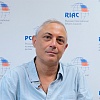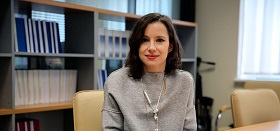RIAC continues its interview series with prominent Russian writers. Nikolay Markotkin, the Council’s Media and Government Relations Manager, talks to Evgeny Chizhov about his novel “Translated from Word-for-Word Translation,” the specifics of the Russian identity, and the problems of promoting Russian literature abroad.
RIAC continues its interview series with prominent Russian writers. Nikolay Markotkin, the Council’s Media and Government Relations Manager, talks to Evgeny Chizhov about his novel “Translated from Word-for-Word Translation,” the specifics of the Russian identity, and the problems of promoting Russian literature abroad.
In a recent interview for our website, Vladimir Medvedev referred to you as an exception — the only author of novels based on the theme of Central Asia who is not biographically related to that region. Where does your interest in Central Asia stem from?
I would not say that I am any exception. A Russian-speaking writer from Central Asia — now that would be quite a rarity. I belong to that last generation of Soviet people who had a rather strong interest in Central Asia, or rather in the East in general. I personally became interested in the region even before university, during my final years at school, that is, in the early 1980s. The last generation of Soviet youth were greatly influenced by Western counterculture: English-language music and the Beat literature. This counterculture was largely oriented towards the East, as distinct from the traditional, self-centred Western culture. It turned to the East not so much as a source of creativity but rather as a source of new spiritual horizons — mysticism, philosophy and religion.
I first visited Central Asia as a young university student, and continued to go there in the 1990s for a number of reasons. In his The Path of the Sacred Capricorn, Vladimir Guzman (Videman) aptly describes the Moscow and Baltic underground of that period, and the mass pilgrimages that the people who belonged to that scene took to Central Asia. The movement was so massive that the authorities would issue special permits for those traveling to Tajikistan in search of Shambhala and the Yeti so that they would be rendered support on arrival. To an extent, this craze was controlled by the security services, the idea being that these people were better off engaged in fairly innocuous mysticism than joining the dissident movement, which had by then become widespread and was quite active. So, this interest was massive. But the people keen on Eastern mysticism were, for the most part, not literary types. In fact, I only started writing about Central Asia in my third book: the first two novels had nothing to do with it.
You mentioned the great influence of the Beatniks, but that movement was mostly tapping into the culture of East and South Asia: things like Zen Buddhism, Hinduism and Krishnaism (in Allen Ginsberg’s case). Did the Muslim East become a comparable source of inspiration for Soviet people?
It is just that the Muslim East was close by, and visiting those parts was easy. The Muslim East implies Sufism, which is no less interesting than Buddhism: Sufi orders and teachers still exist in that region. For me personally, Central Asia has always held greater appeal than the Buddhist countries: any manifestation of mysticism there is based on hard reality, whereas Buddhism teaches you to perceive the reality as an illusion, which is something I do not relate to at all.
Does this mean Soviet authors took no particular interest in Buddhism?
I guess they took an interest in pretty much everything, but with varying results. Those were the times of “the twilight of the empire”: on the one hand, the authorities were already too weak to control everything, while on the other hand, they were still strong enough to take care of their citizens by granting them lifelong social security in stress-free jobs. There were not that many people wishing to make a career in the Soviet Union, at least not among my acquaintances, quite a lot of whom joined underground movements. What Boris Grebenshchikov referred to as the generation of janitors and night watchmen actually comprised thousands, maybe tens of thousands of people. So, they were interested in everything, it is just that Central Asia was close, easily accessible and, importantly, the locals spoke Russian. Though I did know people who crossed the border into Tibet. In general, people tried everything and indulged in various spiritual experiences.
Where do your readers live? Do they read you in Central Asia and other post-Soviet states? Have you had any feedback from there?
I cannot say much about this, except that about a week ago I received a very complimentary letter about Translated from the Word-for-Word Translation. It was a letter from a lady called Dinara, and she had this long Uzbek last name that escapes me right now, I am afraid. I believe you would do better asking my publisher — I do know that their distribution network covers both Russia and the CIS. Recently, a friend of mine visited Vladivostok and told me afterwards that I am known by the local reading public, which is certainly pleasant. I have come across some Tashkent-based writers, and they told me they had read Translated from Word-for-Word Translation. But I have no idea about the size of my audience outside Russia.
How did the public in Russia receive your novel?
The reception was good: the novel was shortlisted for the Big Book and Yasnaya Polyana awards, and there were a plenty of reviews. Quite unexpectedly for me, it received the Venets [Coronet] award from the Union of Moscow Writers. Unlike my previous two novels, this one actually did take off, so much so that the publisher had to print additional copies. I can’t complain. After all, I have never been one of those authors who worries about how many copies I am selling: this is the concern of the publisher.
In your speech at a writers’ convention in Yasnaya Polyana, you expressed the idea that, in order to find the truth, you need to transcend your own identity. Can this be done by immersing oneself in a different culture, like the fictitious country of Koshtyrbastan? Did writing the novel help you transcend your identity?
Immersing yourself in something that is alien to you is not the key to expanding your identity or acquiring a new one, but rather the rejecting of what you consider to be your own. The difference between an artist and a non-artist is in that the artist can expand his or her identity through creativity. Every new book, unless it is a repetition of previous works, gives the author an opportunity to define themselves through it, to leave their intrinsic identity behind, to become the person who actually wrote the book. It is this chance for an artist to redefine themselves that is perhaps the most important result of creativity.
Translated from Word-for-Word Translation provided me with Koshtyrbastan, a fictitious yet quite detailed country where I can always hide if there is no place left for me in real life. In general, imaginary spaces certainly expand one’s spiritual horizons. As for the main character, he takes this road to the very end: after all, giving up one’s own identity is a risky procedure, it calls, among other things, for giving up the protection offered by the opinions and tastes of your social circle. It is no wonder, therefore, that this leads the main character to a tragic end.
Could this thesis about transcending one’s identity be extrapolated to an entire country?
The country is normally one of the cornerstones of identity. In this sense, Russia is characterized by the absence of a solid identity — it keeps oscillating between the East and the West. Russia has what I would call a fluid identity, partly Eastern, partly Western. This is, in fact, a good and productive trait, despite the fact that it generates endless debates. The country is in a position to take the best from both the East and the West. Obviously, Russian culture of the past three centuries has been leaning towards the West, but its periodic departures from the West are not less productive, as they allow the country to redefine itself anew.
What is the Eastern component of Russia’s identity?
That would be Orthodox Christianity which, it seems to me, is in many respects an injection of the Eastern outlook into the Western canons. The idea of grace being granted irrespective of a person’s merits is fairly Eastern, at the very least Byzantine. Grace can be granted to totally unworthy people, such as thieves, as long as they repent, which often happens in legends. At the grassroots level, Russia is more Eastern than it is Western: it is a centaur of sorts, with a Western head and Eastern legs. The government structure is also more Eastern than Western. In other words, Russia can be pictured as an Eastern person that is fluent in European languages, but speaks them with a noticeable Asian accent.
In your novel, the main character, the poet and translator Oleg Pechigin, also plays the part of a useful idiot, one that secures the illusory international recognition for the authoritarian People’s Leader. Do Russia and other post-Soviet states share Koshtyrbastan’s need for a foreigner that would pat on them on the shoulder and say that everything is going to be fine?
Yes, this is the reverse side of the coin, the inevitable consequence of the special path that Russia has always followed, ever since the adoption of Orthodox Christianity. Following the Russian Revolution, we believed that the country was the trailblazer of historical processes. But if a country chooses its own way, there needs to be someone on the outside to confirm that this particular way is correct. In fact, many Eastern countries, such as Tajikistan and Uzbekistan, have a similar idea of their own special path.
Your novel touches upon the relationship between the artist and the authorities. Symbolically, the main character’s rapprochement with the powers that be is what ultimately leads to his demise. You have said in the past that politicizing art “turns peace into a clandestine war.” Do you believe a creative person can cooperate productively with the authorities?
I believe the artists must keep their distance, and the authorities’ job is to use the artist not only to their own gain, but also in the interests of the country and its culture. This is something that France has been actively doing by providing grants for translations of French literature into foreign languages. The United Kingdom and Germany are also doing this. That said, it is important for the artist to pursue his or her own goals, rather than serving the powers that be, even when it might appear to them that the authorities’ cause is just. It is also important to stay away from the opposition, which always seems to know how things should be done correctly but actually has a no less authoritarian range of views. The authorities tend to dispose of artists after they have been used, suffice it to recall the fate of Vladimir Mayakovsky or Kazimir Malevich. But those artists who invest their time and talent in criticizing the authorities quickly become unnecessary and uninteresting: power changes hands, and nobody is interested any longer in denunciations of the previous government. This kind of activity is reactive, it is secondary, a monotonous response to the actions of the authorities. This work is better left to journalists.
How politicized is literature today? Do you address current politics at all in your works?
It is not literature that is politicized, but rather individual authors. In general, though, many realize that politicization is the least interesting path for an author to take, seeing as the current authorities will inevitably go. Meanwhile, artists create their work for tomorrow, they want to reign the future. On the other hand, it is impossible to ignore politics completely. Joseph Brodsky used to say that money is the fifth element; well, then politics is the sixth. Turning a blind eye and pretending that politics does not exist just does not work. But it is important for an artist to not serve politics — politics should serve the artist. As a field in which a person can manifest themselves in an unexpected way, politics is of the same interest as any other aspect of life. Now that you cannot get rid of it, you need to use it.
Does Russian literature still exist as a uniform phenomenon, or has it been split into isolated regional exclaves, such as in Ukraine, Central Asia, the Baltic States, further abroad, and so on?
As far as I know, it is the opposite. Unlike Soviet times, at present there is virtually no interest in Russian literature outside of Russia. In a recent interview, Dina Rubina says that in her 30 or 40 years of living in Israel, her works have almost never been translated from the Russian. There is fairly low demand for Russian writers’ works in Uzbekistan, even less so in Europe and the United States. New York’s oldest Russian-language bookshop on Broadway was recently closed. In Soviet times, emigre magazines and publishing houses in Europe and the United States would receive support for understandable political reasons. There is no such support now, so writers residing abroad have no other reference point but Russia. One can write while lying on an Australian beach, but it will still be a uniform body of Russian literature, in fact more uniform than when literature was segregated into censored Soviet books and uncensored emigre publications.
Do your works get translated into foreign languages? What, in your opinion, prevents Russian authors from entering foreign markets?
Translated from Word-for-Word Translation has been translated into Estonian and Arabic. The Arabic text has actually been nominated for some translation award. I have also received proposals from German, British, American and French translators. However, since I do not receive any government support, there have so far been no translations into any other languages.
I believe that the rich English- and French-language literatures, especially in the United States, have enough of their own writers to make the demand for Russian authors insignificant. It is Russia that is obsessed with the US; in the United States, news from Russia rarely makes headlines. During Perestroika, Russia was of interest to some as a country of radical change, but now Americans are happy with their own authors. For them, the intellectual beacon is situated in Europe, in France. The only country that has always been interested in Russia is Germany.
I believe this is normal. Russia is a country with a reasonably self-sufficient culture. The West will catch up. Just like it discovered Dostoevsky, and everybody began reading his works. Similarly, the key topics of existentialism, absurdist fiction and many other phenomena of the 20th century first emerged in Russia, half a century before they were embraced by Western philosophy. It is important to not imitate Western models, to not believe that the only light is the one coming from the West.
Thank you for this interview. On to our last question: What fiction and non-fiction works have you recently read that you would recommend to our readers?
I do not read much fiction when I write myself. I can recommend Irakli Kvirikadze’s A Boy Walking After a Wild Duck. Kvirikadze is a screenwriter, a very famous name in cinema, but he is less known in literary circles. The book is absolutely brilliant, rare in its richness of story lines and the brilliance of transitions from the comic to the tragic. I always recommend Denis Osokin, a truly unique writer unlike any other. Osokin is also better known as a screenwriter than a writer, he works with film director Aleksey Fedorchenko. Osokin’s works are completely outside the existing genres and formats; there simply does not exist an award to nominate him for, except perhaps for the Nobel Prize. The following two are widely known, but I really appreciated them: Roman Senchin’s classic The Yeltyshevs and Vladimir Sharov’s brilliant The Rehearsals.







